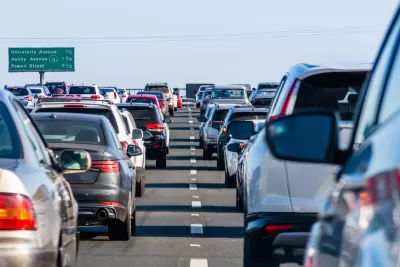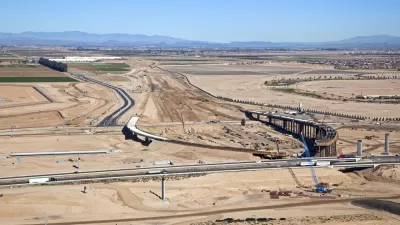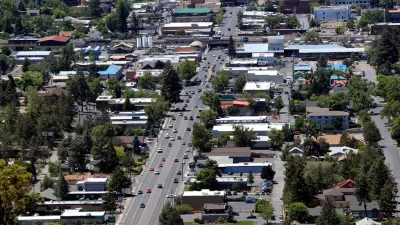The argument is being used to channel climate funding to projects that expand automobile infrastructure, according to an analysis from Transportation for America.

Federal funds aimed at reducing carbon emissions are being used for highway expansion projects, according to an analysis from Transportation for America. As Benton Graham explains in Bloomberg CityLab, the researchers used an AI model to identify projects that expand automotive infrastructure among roughly 60,000 projects nationwide.
The analysis found that a quarter of funds from the Infrastructure Investment and Jobs Act (IIJA)’s Carbon Reduction Program (CRA) are being used for road projects that, according to the organization, “stand to embed high transportation emissions for decades, incentivizing driving and encouraging ever-more-sprawled-out development and land use patterns.”
State agencies, which decide how funds are allocated, claim highway expansions can reduce emissions and air pollution by improving traffic flow and adding energy efficiency upgrades. “But experts point to decades of evidence showing that adding lanes is no fix for congestion, thanks to the well-documented principle of induced demand.” In Houston, peak hour travel times increased three years after a massive $2.8-billion freeway expansion.
“What does work? Policies that deincentivize driving — think stiffer tolls, congestion pricing and zone-based driving fees like London’s Ultra Low Emissions Zone, which charges drivers of high-polluting vehicles.”
FULL STORY: US Climate Funds Pay for Highway Expansion

Planetizen Federal Action Tracker
A weekly monitor of how Trump’s orders and actions are impacting planners and planning in America.

Restaurant Patios Were a Pandemic Win — Why Were They so Hard to Keep?
Social distancing requirements and changes in travel patterns prompted cities to pilot new uses for street and sidewalk space. Then it got complicated.

Maui's Vacation Rental Debate Turns Ugly
Verbal attacks, misinformation campaigns and fistfights plague a high-stakes debate to convert thousands of vacation rentals into long-term housing.

In California Battle of Housing vs. Environment, Housing Just Won
A new state law significantly limits the power of CEQA, an environmental review law that served as a powerful tool for blocking new development.

Boulder Eliminates Parking Minimums Citywide
Officials estimate the cost of building a single underground parking space at up to $100,000.

Orange County, Florida Adopts Largest US “Sprawl Repair” Code
The ‘Orange Code’ seeks to rectify decades of sprawl-inducing, car-oriented development.
Urban Design for Planners 1: Software Tools
This six-course series explores essential urban design concepts using open source software and equips planners with the tools they need to participate fully in the urban design process.
Planning for Universal Design
Learn the tools for implementing Universal Design in planning regulations.
Heyer Gruel & Associates PA
JM Goldson LLC
Custer County Colorado
City of Camden Redevelopment Agency
City of Astoria
Transportation Research & Education Center (TREC) at Portland State University
Jefferson Parish Government
Camden Redevelopment Agency
City of Claremont





























